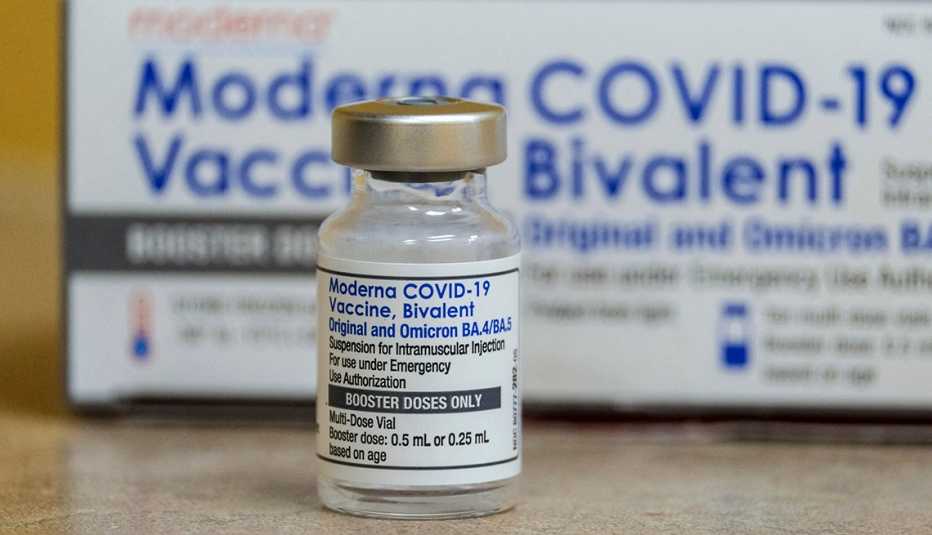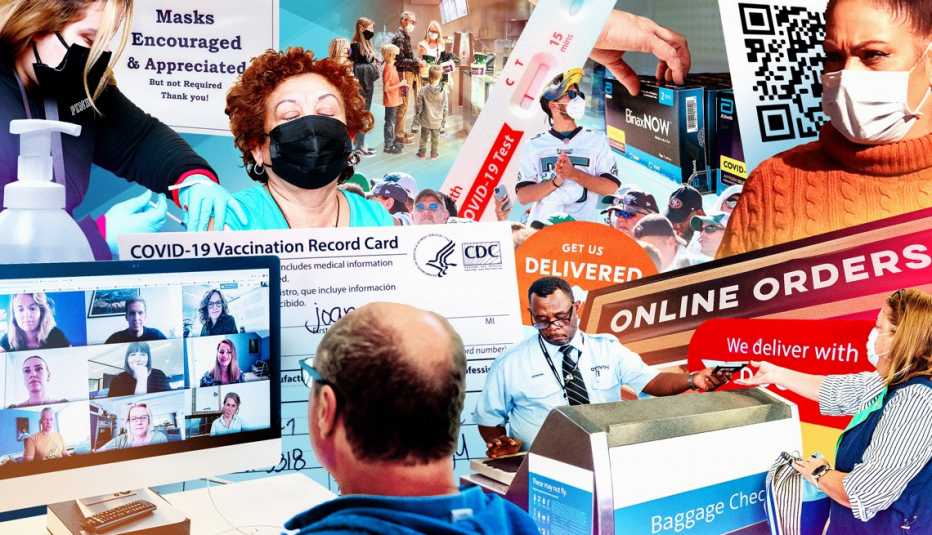Staying Fit
As the pandemic enters its fourth year, it remains especially important for older adults who are most at risk for severe illness and death from COVID-19 to remain informed about the latest developments with the disease, including with vaccines. Here’s a summary of recent vaccine news that’s particularly relevant to people 50 and older, followed by answers to some of the most frequently asked questions about COVID-19 vaccines.
Latest COVID-19 vaccine news
Johnson & Johnson vaccine no longer available. The Janssen (Johnson & Johnson) COVID-19 vaccine is no longer available in the United States. According to the Centers for Disease Control and Prevention (CDC), the government supply of that coronavirus vaccine expired on May 7. The agency has told providers to dispose of any stock they have of that vaccine. The CDC is also advising Americans 18 years old and older who have been vaccinated with the J&J product to now get a dose of the bivalent vaccine — either the Pfizer or the Moderna product. The J&J vaccine has been the least used of the coronavirus vaccines available in the U.S. According to CDC data, of the more than 270 million Americans who have received a coronavirus vaccine, 19 million got the J&J product.
Health officials support second updated booster (April 19). U.S. health officials have given the green light for people age 65 and older and those with compromised immune systems to receive a second bivalent vaccine. Older adults are now eligible to get a second booster at least four months after receiving their first omicron-specific shot. People with weakened immune systems are eligible for a second booster two months after their initial one. And after that, those with severely compromised immune systems are eligible for additional boosters at their health care provider’s discretion. The additional boosters continue to be free of charge. Health officials have also decided to retire the original Pfizer-BioNTech and Moderna monovalent mRNA vaccines in favor of the updated formula that targets omicron subvariants as well as the original coronavirus.
CDC adds COVID vaccines to recommended schedule for adults (Feb. 10). The Centers for Disease Control and Prevention (CDC) added the COVID-19 vaccines to its recommended vaccine schedule for adults and children. The updated schedule, published Feb. 10 in a Morbidity and Mortality Weekly Report, also reflects changes in influenza vaccine recommendations. Going forward, older adults should receive what’s often referred to as a high-dose flu shot. You can find the updated vaccine schedule for adults on the CDC’s website.
Bivalent boosters are effective against latest circulating variants (Feb. 3). The updated COVID-19 boosters formulated to target the BA.4 and BA.5 omicron subvariants circulating in the summer and fall are effective at preventing mild illness caused by some of the newer variants, including XBB.1.5, which is now the dominant strain in the U.S. A report from the CDC found that these so-called bivalent boosters cut the risk of a symptomatic infection nearly in half in adults ages 18 to 49. The boosters were 40 percent effective against symptoms from a coronavirus infection among individuals 50 to 64 years old, and 43 percent effective among those 65 and older.
Frequently asked questions about COVID-19
What, exactly, is a vaccine?
A vaccine helps a person build up immunity to an infectious disease. It works by intentionally introducing the body to an inactive form of a disease-causing germ, or something similar to it. This stimulates the immune system’s production of antibodies, the proteins that help protect the person from an infection.
Think of it like a workout for your immune system: You’re “sending it to the gym and preparing it to be able to do something” in case it meets up with the germ, explains Tony Moody, associate professor of pediatrics and immunology at the Duke University School of Medicine and a principal investigator at the Duke Human Vaccine Institute. “Essentially, what a vaccine is doing is teaching the immune system how to handle something before you actually encounter the real thing — so that, hopefully, when you do encounter the real thing, you’re able to deal with it quickly and get rid of it,” he says.
What coronavirus vaccines are available?
There are four COVID-19 vaccines available in the U.S.:
• A bivalent (omicron-specific) mRNA vaccine from Moderna
• A bivalent (omicron-specific) mRNA vaccine from Pfizer-BioNTech
• A protein subunit vaccine from Novavax (read more about the vaccine here)
• A viral vector vaccine from Johnson & Johnson (J&J)
People 6 months and older are eligible for bivalent mRNA vaccine. Individuals 12 and older can get the Novavax vaccine, and adults 18 and older can receive a J&J shot. However, the CDC recommends the Pfizer and Moderna vaccines over the J&J shot because a rare but serious blood-clotting disorder has been linked to the J&J version. But J&J’s vaccine is still available for people who are “unable or unwilling to receive an mRNA vaccine,” the CDC says.
The vaccines lower your risk of getting infected with the virus that causes COVID-19 and are effective at preventing severe illness from an infection. Unvaccinated individuals are more than 10 times more likely to be hospitalized with COVID-19 than their vaccinated peers who are up to date on their COVID-19 vaccines, federal data from February 2023 shows. Death rates are also higher among unvaccinated adults.
Are the vaccines safe?
It’s common to experience mild to moderate side effects after getting vaccinated, such as soreness in the arm, headache, fatigue, muscle and joint pain, nausea, fever or chills — but these are temporary “and normal signs that your body is building protection,” the CDC says. What's more, they are in line with side effects that some people experience from other vaccines, including the flu shot and the vaccine to prevent shingles.
More serious reactions have occurred but are rare. Anaphylaxis, a severe allergic reaction, has happened in a small number of people after COVID vaccination, the CDC says. This is why you may be asked to wait about 15 minutes after your shot or booster to monitor for symptoms. Vaccine providers are equipped with medicines to quickly treat the reaction.
Health officials are monitoring rare reports of myocarditis and pericarditis in adolescents and younger adults who received the Pfizer, Moderna or Novavax vaccines. Most of these patients who received care responded well to medicine and felt better quickly, the CDC says.
Another uncommon event linked to J&J’s vaccine is a rare but serious clotting disorder, called thrombosis with thrombocytopenia syndrome. Sixty cases of the condition were confirmed as of March 2022; nine were fatal. Women in their 30s and 40s are most at risk. After reviewing evidence of the adverse event, the CDC decided in December 2021 to recommend Pfizer’s and Moderna’s vaccines over J&J’s version. Months later, the FDA limited its use; however, J&J’s vaccine is still available to those who are “unable or unwilling” to get the Pfizer or Moderna vaccine.
How much do vaccines cost?
The federal government purchased hundreds of millions of vaccine doses with taxpayer money, so Americans do not have to pay when they receive them, including the booster shots, though this could change for some people when the public health emergency ends.
Can I still get COVID-19 after getting vaccinated?
Because no vaccine is 100 percent effective, breakthrough infections can occur, and more are reported as omicron and its subvariants rip through the country. But experts stress that the vaccines and boosters remain protective against hospitalization and death.
Breakthrough infections can contribute to the spread of COVID-19, which is why health officials recommend that vaccinated individuals in areas of high community transmission wear a face mask in indoor public settings.
Do I need the vaccine if I have already had COVID-19?
Even if you had COVID-19, the CDC recommends getting vaccinated and boosted.
Getting a COVID-19 vaccine after having the illness provides added protection against the virus that causes COVID, the CDC says. Plus, people who already had COVID-19 and do not get vaccinated after their recovery are more likely to get COVID-19 again than their vaccinated peers, the agency notes.






































































